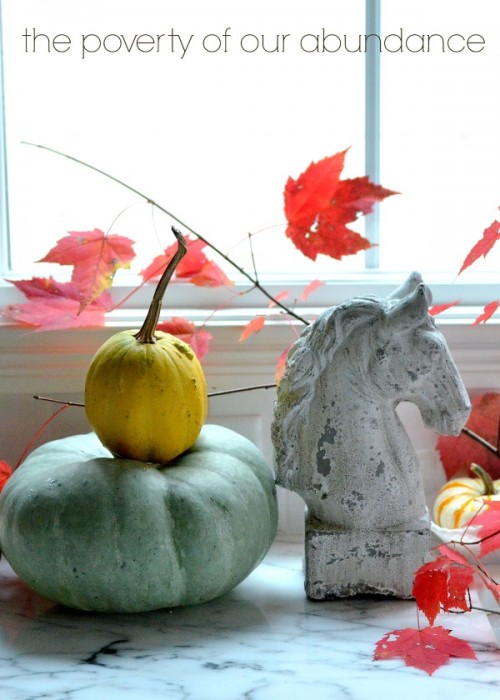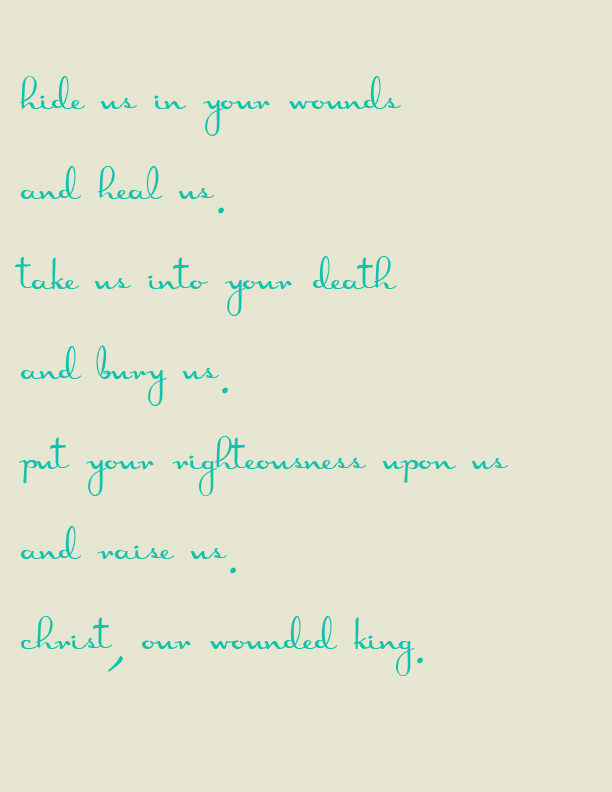
This week we are swimming in abundance.
I spent the weekend making all manner of preparations. While Stevie smoked back ribs all day yesterday, the rest of us flew into a frenzy of buying and storing and cleaning and prepping and sewing and ciphering. All this to make sure 28 people know how thankful we are to have them in our lives.
Everywhere I turn in my house, there’s excess. I have bowls and stemware and linens and food and candles and silver, galore.
There is wealth and bounty aplenty.
Everywhere, that is, except in me.
It’s the poverty of my own heart that scares me to death.
It’s my inability to be who I was created to be.
It’s my impatience and unkindness to my children—-the lack of grace and love and joy.
It’s the tally of hurts done against me that I keep record of and file away for later use.
It’s the wretched cycle of my own sin that makes me sick.
And when I stood at the end of this week, looking at the trail of brokenness, that’s when I saw the beautiful paradox of want.
This poverty of spirit that plagues me is the beginning of repentance. This is where I find Him.
When I have come to the end of my resources, to the last shred of hope in myself, that’s where He waits.
And the truth is, the sooner we discover this poverty—that we all happen to share—-the sooner we can learn to live from His wealth.
Because everything is His.
And if our hands weren’t so full of our own decaying riches, He’d show us what abundance really looks like.
It looks something like peace, joy, love, kindness, gentleness, goodness, faithfulness, meekness, temperance, forgiveness.
We may be the richest (most in debt) country on earth but we live in sheer destitution.
Our lives look more like strife, sadness, cruelty, harshness, wickedness, faithlessness, stubbornness, excess, blame.
At least mine does, if I’m honest.
And I hate my inadequacy. I want, for all the world, to be capable and industrious—to have it all figured out, to have the perfectly coiffed life.
And you probably do too.
We don’t want to feel our need, our desperation.
So we hide, we medicate, we pretend, we run, we seek cheap relief wherever it may be found.
But at the end of the that long, scary road of our stubborn self-sufficiency and our rusty heap of riches and our swirling addictions, He waits.
Because He is gentle and kind and faithful and full of peace and forgiveness.
He is love, incarnate.
And He became flesh to know this very pain. He took on this desperate poverty in which we live to give us wealth untold. He is our Father. And our inheritance cannot be measured.
And if we are wise, we will learn to thank Him for those things that remind us of our true condition: the very circumstances that break our hearts and cause us to despair.
Those are His gift to us, to help us see clearly.
By nature, we hate the heartache which drives us to Him and keeps us begging for relief, begging for answers, begging for the scraps from His table.
But from that lack, he will give us heaven.
Let us not forget that it was in desperation that David wrote Psalm 51 and from prison that Paul wrote Ephesians and Colossians.
It’s in our poverty, not our abundance, that He will give us His kingdom.
We don’t have to try to be poor in spirit to receive His kingdom. We are poor in spirit and we must beg Him to show us our emptiness in order that He may fill us with the bounty from His table.
Everything is His. And so everything is yours.
“Taste and see that the Lord is good. Blessed is the man who takes refuge in Him.”



